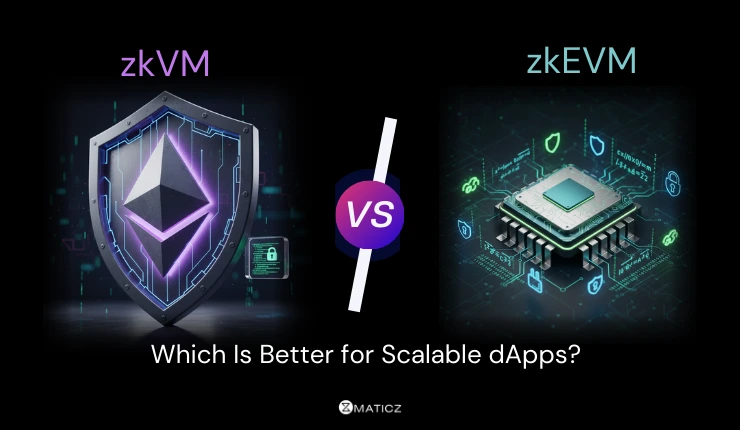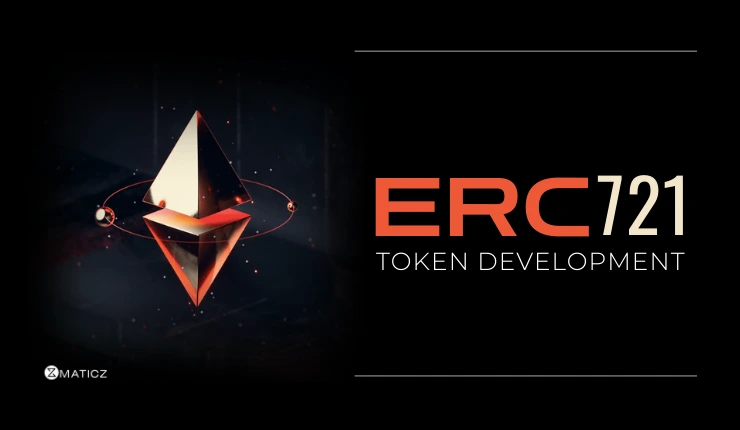Share Posts

zkVM or zkEVM: Which Is Better for Scalable dApps?
46
1599
103
As the blockchain space continues to evolve, one of the demanding challenges that remains constant is scalability. Layer 1 solutions, such as Ethereum, offer decentralization and security, but often fall short in performance, resulting in slow transactions. Here is where zero-knowledge (zk) rollups enter the play by becoming the strategic approach to foster scalability and security for decentralized applications (dApps).
If you are new to this concept, it is pivotal to understand zero-knowledge rollups. ZK rollups are the type of layer 2 solution that employs zero-knowledge proofs to bundle and verify off-chain transactions until proven, thereby fostering scalability and efficiency.
This being so, the two technologies that are emerging in the ZK space are zkVM and zkEVM. Both zkVM and zkEVM are zero-knowledge virtual machines that bring zero-knowledge proofs for smart contract execution, adding an extra layer of scalability and privacy to the dApps. But the question that arises here is: which is better for developing scalable dApps? There is no all-inclusive solution; rather, it depends on the priorities of the projects, such as the specific goal, long-term vision, target audience, etc.
In this blog, we will go over a detailed analysis of zkVM and zkEVM, compare their key strengths, and decide which suits you best for building scalable dApps.
What is zkVM?
A zkVM is a general-purpose zero-knowledge virtual machine used for generating efficient zero-knowledge proofs supporting non-EVM programming languages such as Rust, Go, Move, etc. The zero-knowledge virtual machine (zkVM) is built from the ground up, which aids in generating efficient smart contracts and computations through zero-knowledge proofs. The common types of zero-knowledge (ZK) proofs generated by zkVM are zkSNARK and zkSTARK.
zkSNARK
It stands for zero-knowledge succinct non-interactive argument of knowledge. It is non-interactive and requires a trusted setup phase to generate ZKPs to facilitate private transactions.
zkSTARK
It stands for zero-knowledge scalable transparent argument of knowledge. It is designed to be scalable and transparent. Unlike zkSNARK, it does not require a trusted setup; rather, it is quantum-resistant.
ZkVM prioritizes privacy and emphasizes that the computation is verified correctly without disclosing the actual data. It is best-suited for applications that prioritize privacy. ZkVM is more flexible since it does not have the need to replicate the existing system, like the Ethereum virtual machine. It is mostly built on RISC-V and WASM-based architecture. The RISC-V architecture is open and is designed to minimize computational complexity, which significantly helps in scalable and high-performing decentralized applications (dApps). The WASM architecture is designed around the WebAssembly runtime, which enables compatibility with diverse tools and programming languages.
Pros and Cons of zkVM
Benefits of zkVM:
Scalability
zkVM offers greater scalability by processing computations off-chain and generating zero-knowledge proofs on-chain. In this way, the transactions can be processed faster, and it also reduces the load on the blockchain network.
Privacy
Privacy is one of the positive elements of zkVM. Through the zero-knowledge proofs, zkVM validates the computations without revealing the actual data to the blockchain network or any third party by enhancing user privacy.
Security
zkVM minimizes the dependency on centralized validators and ensures trustless transaction verification. They leverage non-interactive zero-knowledge proofs, which eliminate the communication between the parties, reducing the potential for risks.
Drawbacks:
Complexity
zkVM might introduce technical complexity for the developers since they need to have a deep understanding of zero-knowledge proofs and blockchain architecture. This increases development time, and the developers need a learning curve.
Computational Overhead
Though zkVMs offload the computation off-chain, generating zero-knowledge proofs, especially in zkSNARKs, it can bring computational overhead, which might bring performance bottlenecks for complex blockchain applications.
Trusted Setups
In zkVM, zkSNARK demands a trusted setup phase to create cryptographic parameters to create and verify zero-knowledge proofs. This setup should be maintained properly, and if compromised, it might lead to security issues, leading to the creation of fraudulent proofs.
What is zkEVM?
A zkEVM is a zero-knowledge virtual machine that is compatible with the Ethereum Virtual Machine, designed to execute Ethereum smart contracts by generating zero-knowledge proofs (notably zkSNARK and zkSTARK). Unlike EVM, zkEVM emphasizes executing these computations off-chain without the involvement of the Ethereum mainnet. zkEVM focuses on improving scalability, reducing gas fees, optimizing performance, and boosting security without compromising Ethereum compatibility.
The presence of zkEVM is to maintain compatibility with the Ethereum ecosystem and develop scalable dApps that are compatible with Ethereum. On that account, this compatibility empowers the developers to write smart contracts similar to those of EVM without relying on any other new languages.
zkEVM is a layer 2 solution, a specific type of zk-rollup, which fosters scalability by offloading computation from the Ethereum mainnet and submitting the ZKPs to the main layer for verification. zkEVM is well-suited for blockchain applications that prioritize decentralization and scalability.
Pros and Cons of zkEVM
Benefits of zkEVM:
EVM Compatibility
zkEVM is engineered to be EVM compatible, where the developers can smoothly transition from the existing Ethereum infrastructure to the zkEVM network without rewriting the smart contracts or shifting to other programming languages.
Low Gas Fees
zkEVM plays a pivotal role in minimizing gas fees associated with on-chain execution. It reduces the on-chain computation by minimizing the amount of data processed, which significantly helps in minimizing the transaction cost.
Faster Transaction Finality
zkEVM stands out in terms of speed. It speeds up transaction finality by instantly validating the zero-knowledge proofs submitted to the network. This ensures that the transactions are confirmed faster, enabling a smooth experience.
Drawbacks:
Complexity
zkEVM relies on advanced cryptographic techniques, which might be difficult for developers accustomed to a traditional development environment. It requires steep learning curves for the developers as it brings technical complexity.
Slow Proving Time
Slow proving time is one of the major downsides of zkEVM. Generating ZKPs like zkSNARKs and zkSTARKs is computationally expensive and might slow down the proving time. This might slow down the transaction finality and affect the overall throughput.
Deployment Delay
Another limitation that accompanies zkEVM is deployment delay owing to the time and resources required for the thorough validation of ZKPs. Also, the zkEVM is an evolving technology, and it might be difficult for developers to adapt to the technology and build zkEVM-powered applications.
ZkVM Vs zkEVM: Key Differences
Both the zero-knowledge (ZK) scaling solutions - zkEVM and zkVM are dominating the blockchain realm as the industry is shifting towards scalability. Thus, understanding the differences between them is crucial to developing high-performing, scalable dApps. Take a look over the following table that highlights the key differences between zkVM and zkEVM, helping you make a strategic decision according to your project goals.
| Features | zkVM | zkEVM |
| EVM Compatibility | Fully EVM compatible | Non-EVM compatible (Custom logic) |
| Smart contract language | Solidity, Vyper | Rust, Go, C |
| Proof generation time | Slower due to complex EVM logic | Faster, optimized for zk-proofs |
| Scalability | High scalability | High scalability owing to custom scaling |
| Privacy | Moderate privacy (Focus on scalability) | Strong privacy (No revealing of sensitive data) |
| Developer Experience | Easy for Ethereum developers (reuse existing tools) | Developers need a learning curve for non-EVM languages |
| Use case | Best for migrating existing Ethereum dApps | Ideal for high-performing and privacy-dependent apps |
| Examples | Polygon zkEVM, zkSync Era | Risc Zero, zkWASM |
zkVM or zkEVM: Which is better for scalable dApps?
In the debate between zkVM and zkEVM for developing scalable dApps, the better choice highly depends on your project's requirements, primarily in terms of scalability, performance, compatibility, and developer flexibility. Both zkVM and zkEVM are designed for their own merits and limitations. So it works better when you have a thorough understanding of your project demands and the ins and outs of zkVM and zkEVM. If you still find difficulty in choosing the better choice, the following breakdown will help you opt for the right one.
Choose zkEVM When:
- You are developing dApps on Ethereum and want EVM compatibility.
- You want to avoid rewriting smart contracts and stick to existing Solidity contracts.
- You emphasize faster deployment and transaction finality.
Choose zkVM When:
- You want to create high-performance dApps with custom logic.
- You are open to programming languages like Rust, Go, etc.
- You look for long-term scalability and prioritize privacy.
Final Thoughts
The momentum behind zero-knowledge virtual machines is dominating the blockchain landscape by reshaping the scalability, privacy, and security. The continuous maturation of the zero-knowledge (ZK) solution shows that both zkEVM and zkVM are not competing solutions but a strategic tool or an approach to creating scalable decentralized applications (dApps). So when deciding on choosing the ZK virtual machine, go ahead with the one that serves best for the technical goals of your project.
The ZK-powered ecosystem is growing, which is laying the foundation for creating a new generation of decentralized applications. If you are looking to be a part of this innovation, then partner with Maticz, the leading zk tech development company that leverages zero-knowledge (ZK) technology to create and deploy powerful and high-performing decentralized applications. Tap into the ZK ecosystem by launching scalable dApps leveraging the zkVM and zkEVM architectures.
Tap Into the Future
The latest insights, posts, and project updates - straight to your inbox.



